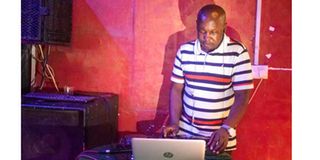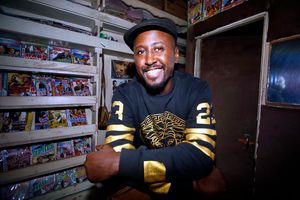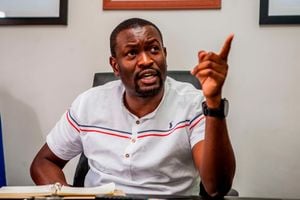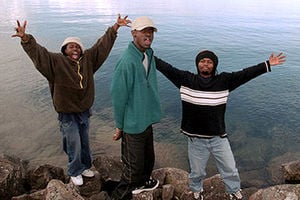
Derick Shimoli alias DJ Derick, a visualy impaired deejay, in action at Touchdown Club in Donholm, Nairobi.
Admittedly, this story starts from a point of scepticism. Is Derick Shimoli alias DJ Derick really a visualy impaired deejay or this is one of those stories? You know Nairobi and its clever people.
I want to witness it. I want to prove or disprove. And I have a plan.
Friday 6.10pm finds me at the Touchdown club in the old Donholm shopping centre. I walk in like any thirsty patron would after a long January week, which feels like the 26th week of the month. I ask for a soda, which comes perfectly cold.
There is a deejay doing his thing. I have been conversing with DJ Derick mostly via WhatsApp prior to the visit but I have never met him in person. He may, or may not, be this one. I don’t want to introduce myself just yet. I am here to prove something, remember?
Rhumba music massages my eardrums as the soda calms my throat. Then Wuod Fibi’s “Mago Nonsense” comes on. I want the DJ to notice me. He doesn’t seem to want to take note.
He might be blind, but I’ll need more convincing.
He is busy with his machines. Those earphones that deejays like plugging in their ears are in place. He is a bit too still for a DJ, because some are wont to follow the beat a bit, but it is his style. Every song transitions smoothly into another, and you can tell the person doing those transitions has a trick or two up his sleeves.
Before him is a mixer with at least 60 buttons. Some are cone-shaped knobs, others rectangular, others are equalisers to be jockeyed up and down, all that. Next to the mixer is a laptop with at least 100 keys.
None of those keys or knobs have braille inscriptions. However, I notice that he hits the keys he wants every time he wants to. Any knob he wants, he gets. If he is blind, then there must be some muscle memory or something more magical happening, I say to myself.
I tiptoe closer. He doesn’t seem to register my presence until I speak up to introduce myself. I am sure it is him and that, indeed, he can’t see.
He wasn’t born blind, though. When he was born on January 11, 1974 at the Mater Hospital in Nairobi’s South B, there was a problem with his eyes but he wasn’t totally blind.
“I am told that I was born with a condition called glaucoma conjunctivitis. So, the left eye never saw, but the right eye had residue sight. It was operated on at the Kenyatta National Hospital and it could see. I used that residue sight from my year of birth,” he says.
Using that one eye, he got his education at Buruburu I Primary School up to Standard Seven. However, the effectiveness of that eye kept deteriorating.
“When sitting at the back of the class, I couldn’t see anything on the blackboard. I was moved to the middle and later in the front. A point came when I could not figure out anything on the board. So, the headteacher recommended that I go to a special school,” he says.
He spent a year out of school because his parents knew little about special schools. When he eventually joined the Salvation Army Primary School for the Blind in Thika, he had to be taken back from Standard Seven to Standard Five because he had to learn braille. Tests done on his deteriorating eye in 1998 showed that it was irreversibly getting damaged.
Also Read: DJ Afro - My long journey in movie narration
“This was because I wasn’t going for check-ups. I needed to go to check-ups because pressure was building on the optic nerves and I had no idea that was happening,” he says.
There was an option of having surgery but DJ Derick and his family were told that it might have had adverse effects like causing mental retardation or affecting motion as it touched the brain. They opted to avoid the surgery and for DJ Derick to contend with blindness. He says it took him five years to accept his fate. It was until 2005, he says, that he accepted that he would never see again.
“There was a time I was angry at God,” he says.
He sat his Kenya Certificate of Primary Education examinations in 1998 and proceeded to the Salvation Army Secondary School for the Blind in Thika.
“I studied up to Form Four level. On completing my studies, I went into technology matters; the technology for the visually impaired called Adaptive Information and Communication Technologies,” he says.
Despite being visually impaired, and on account of the studies he received, he was able to work at a call centre serving Celtel from 2009 to 2010. He then stayed at home until an opportunity arose through a training advertised in the “Nation” in 2013. He got training from the Kenya Union of the Blind, a non-governmental organisation. He later got a job with the union, handling advocacy.
He worked with the union until June last year. There was no funding coming in and he was let go.
“We were told to step aside a bit so (the union) could fundraise and see if we could be reinstated (later),” he says.
With the free time, the 50-year-old decided to pursue more fervently a passion he had had since he was a young boy. He remembers that at the age of 10, in 1984, he held a breakdance party using his father’s vinyl record player.
“It’s when I knew that for sure I had a talent in matters music. So, I started practising in the estate, in Buruburu. There was a studio called Studio B at Buruburu Phase II. There, I met deejays like Njogu, Marto, and I practised,” he says. “Come 1996, we moved from Buruburu to Donholm. I met a guy called Elly here in Donholm and we practised together.”
He goes on: “My father was also big on music, though it wasn’t deejaying. He was an engineer with the defunct Kenya Post and Telecommunications. He loved his music; and he would buy records at Asanands at Moi Avenue.”
By the time DJ Derick lost his sight, he knew the tricks of the game, using the old deejay tools used back in the day.
From 2019, he started working as a DJ with the Kenya Union of the Blind as they had opened an entertainment joint as a cash raising venture. He learnt how to use computer-based mixing devices. He found a way of diverting the spoken navigation instructions on the computer so that only the music comes out. He navigates through the computer using his earphones while the music plays, more the reason why he needs to be still.
The chairman of the Touchdown chain of clubs, when asked about the possibility of employing a blind deejay, was hesitant at first but was sold soon after. DJ Derick recalls that in his first show, held on a Sunday, there was an electrifying atmosphere.
“I am asked, ‘How will you know there are people?’ But I have ears, I can hear. I can tell people have come. ‘And how can you know the music you are playing is appealing to the people?’ I tell them, ‘People come and even give me a token of appreciation.’ It is easy to judge a crowd. You just read the mood, and you must not see them. You will hear the applause and the movement of people. It’s either people are dancing or something, especially at the peak hours. You will now know the club is on toes,” he says.
He also uses his microphone to engage the crowd. And he notes that he never likes introducing himself as a blind deejay.
“Don’t tell them because people will think it’s self-pity. Don’t pity yourself. Join them and be seen like you are like them. Many people haven’t even noticed until when they come closer to request and wonder why I am not noticing them,” he says.
DJ Derick plays at the Touchdown club in the old Donholm shopping centre on Friday nights and at another Touchdown branch at Greenfield, Donholm, on Saturday nights.
Stephen Ndung’u aka DJ SN, a colleague of DJ Derick’s, says he is always mesmerised by the 50-year-old’s abilities.
“At first, I didn’t believe it. I remember asking the chairman how I could work with him yet he couldn’t see. But the more we worked, I understood him. He is as good as everyone else. He motivates me to go far,” says DJ SN, the resident DJ at the club.
To handle song requests from revellers, DJ Derick says he plays a long song as he searches for the one requested. I ask him to find a song to make me want to forget my troubles and dance on the grave of the levy that has been denied a house in my payslip. There is one I have in mind — “Achii” by Diamond Platnumz and Koffi Olomide. He takes some time, but he finds it.
Is there something he wishes he could be able to see? His first pick is football. “I wish I could watch the Africa Cup of Nations. My team is Senegal. I think Senegal will win this,” he says, adding he would also like to watch people playing pool.
His employer pays him per performance. DJ Derick has a wife, who is working, and two children — one in Form Two and another in Grade Seven.
I ask him about the most memorable thing he saw last before he lost his sight.
“I saw a very beautiful lady. I thought she would be my wife. I was trying to date her but when she heard I’d gone blind, she vanished.”
I leave when the night is just getting started. This stretch of Donholm is dotted with clubs from alpha to omega, each blasting music. DJ Derick will have to summon all his skills to draw revellers here.








